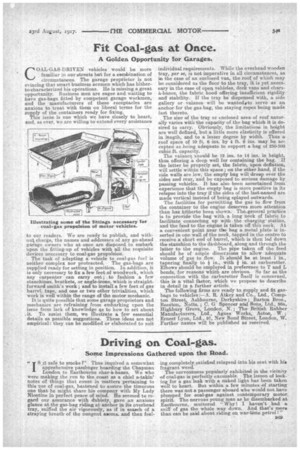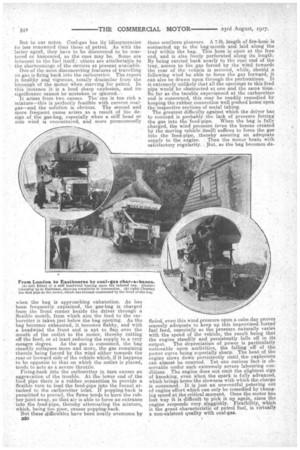Driving on Coal-gas. So m e Impressions Gathered upon the Road.
Page 15

Page 16

If you've noticed an error in this article please click here to report it so we can fix it.
" S.it safe to smoke ?" Thus inquired a somewhat apprehensive passrenger boarding the Chapman
London to Eastbourne char-h.-banes. We who were making the run to the coast as a chiel aetaleini notes of things that count in matters pertaining to this use of coal-gas, hastened to assure the timorous one that he might share his company with My Lady Nicotine in perfect peace of mind. He seemed te regard our assurance with dubiety, gave an anxious glance at the gas-bag riding at anchor in its overhead tray, .sniffed the air vigorously, as if in search of a straying breathof the pungent asoma. and then feel • ing completely,eatisfied relapsed into his seat with his fragrant weed. The nervousness popularly exhibited in the vicinity of coal-gas is perfectly excusable. The lesson of looking for a gas leak with a naked light has been taken well to heart. But within a few minutes of starting there was not a passenger aboard who would not have plumped for coal-gas against contemporary motor, spirit. The nervous young man as he disembarked at Eastbourne, muttered 'Why! I haven't had a sniff of gas the whole way down. And that's more than can be said about riding on war-time petrol !"
But to. our notes. _coal-gas has its idiosyncrasies no less renowned than those of petrol. As with the latter agent, they have to be discovered to be mastered or humoured, as the case may be. Some are inherent to the fuel itself.: others are attributable to the shortcomings of the devices at present available. One of the most disconcerting features of travelling on gas is firing back into the carburetter. The report is healthy and vigorous totally dissimilar from the hiccough of the motor When starving for petrol. In this instance it is a loud sharp explosion, and its significance cannot be mistaken or ignored. It arises from two causes. The one is too rich a mixture—this is perfectly feasible with current coalgas—and the solution is obvious'. The second and more frequent cause arises as a result of the design of the gas-bag, especially when a stiff head or side wind is encountered, and more pronouncedly
when the bag is approaching exhaustion. As has been frequently explained,the -gas-bag is charged from the front corner beside the driver through a flexible mouth, from which also the feed to the ear. .buretter is taken just below the bag opening. As the bag becomes exhausted, it becomes flabby, and with a headwind the front end is apt to flap over the mouth of the outlet to the motor, thereby tutting off the feed, or at least reducing the supply to a very meagre degree. Asthe gas is consumed, the bag steadily collapses more and more, the gas remaining therein being forced by the wind either towards the rear or leeward side of the vehicle which, if it happens -to be opposite to that on which the outlet is placed, tends to acts as a severe throttle.
Firing-back into the carburetter in turn causes an aggravation of the trouble. At tle lower end of the feed pipe there is a rubber connection to provide a flexible turn to lead the feed-pipe into the funnel attached to the carburetter inlet. If popping-back is permitted to prevail, the flame tends to burn the rubber•joint away, so that air is able to force an entrance "into the feed-pipe, thereby attenuating the mixture, which, being too poor, causes popping-back.
But these difficulties have been neatlyovercome by 350 these southern pioneers. A 7-ft, length of fire-hose is connected up to the bag-mouth and laid along the traS7 within the. bag. This hose is open at the free end, and is also freely perforated along its length. By being carried back nearly to the rear end of the tray, access to the .gas forced by the wind towards the rear of the vehicle is secured, while, should a following wind be able to force the gas forward, it can also be drawn upon through the perforations. It is extremely unlikely that all the openings to this .feed pipe would be obstructed at one and the same time. So, far as the trouble experienced at the carburetter end is -concerned, this may be readily remedied by keeping the rubber connection well pushed home upon the respective. sections of metal tubing. The greatest difficulty against which the driver has to contend is probably the lack of pressure forcing. the gas into the feed-pipe. .When the bag is fully charged, the wind pressure (even the breeze created by the moving vehicle itself) suffices to force the gas into the feed.-pipe, , thereby assuring an adequate supply to the. engine. Then the motor beats with satisfactory regularity. But., as the bag becomes de flafed, even this wind pressure upon a calm clay proves scarcely adequate to keep up this improvised forked fuel feed, especially as the pressure naturally varies with the speed of the vehicle, the result being that the engine steadily and persistently falls off in its output. The depreciation of power is particularly noticeable upon acclivities, the falling off of the power curve being especially sharp. The beat of the engine slows down persistently until, the explosions eah almost be counted. Yet one curious fact is observable under such extremely severe labouring conditions. The engine does not emit the slightest sign of knocking, even when the spark is fully advanced, which brings home the slowness with which the charge is consumed. It is just an uneventful petering nut of engine effort which can only be remedied by klianging speed at the critical moment. Once the motor has lost way it is difficult to pick it up again, since the engine responds very .sluggishly. Flexibility, which is the great characteristic of petrol fuel, is virtually a non-existent quality with coal-gas.






















